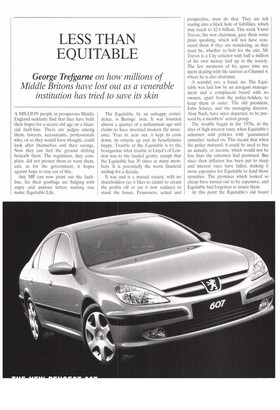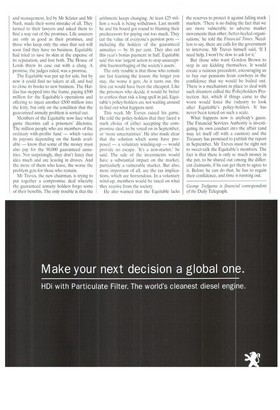LESS THAN EQUITABLE
George Trefgarne on how millions of
Middle Britons have lost out as a venerable institution has tried to save its skin
A MILLION people in prosperous Middle England suddenly find that they have built their hopes for a secure old age on a financial fault-line. There are judges among them, lawyers, accountants, professionals who, or so they would have thought, could look after themselves and their savings. Now they can feel the ground shifting beneath them. The regulators, they complain, did not protect them or warn them, and, as for the government, it hopes against hope to stay out of this.
Any MP can now point out the faultline, for their postbags are bulging with angry and anxious letters naming one name: Equitable Life. The Equitable, by an unhappy coincidence, is Barings' twin. It was founded almost a quarter of a millennium ago and claims to have invented modern life assurance. Year in, year out, it kept its costs down, its returns up and its beneficiaries happy. Trouble at the Equitable is to the bourgeoisie what trouble at Lloyd's of London was to the landed gentry, except that the Equitable has 30 times as many members. It is potentially the worst financial mishap for a decade.
It was and is a mutual society, with no shareholders (as it likes to claim) to cream the profits off or (as it now realises) to stand the losses. Pensioners, actual and prospective, must do that. They are left staring into a black hole of liabilities, which may reach to £2.6 billion. This week Vanni Treves, the new chairman, gave them some plain speaking, which will not have reassured them if they are wondering, as they must be, whether to bolt for the exit. Mr Treves is a City solicitor with half a million of his own money tied up in the society. The few moments of his spare time are spent dealing with the satirists at Channel 4, where he is also chairman.
A scandal, yes, a fraud, no. The Equitable was laid low by an arrogant management and a complacent board with no owners, apart from the policy-holders, to keep them in order. The old president, John Sclater. and the managing director, Alan Nash, have since departed, to be pursued by a members' action group.
The trouble began in the 1970s, in the days of high interest rates, when Equitable's salesmen sold policies with 'guaranteed annuities' tacked on. This meant that when the policy matured, it could be used to buy an annuity, or income, which would not be less than the salesmen had promised. But since then inflation has been put to sleep and interest rates have fallen, making it more expensive for Equitable to fund those annuities. The promises which looked so cheap have turned out to be expensive, and Equitable had forgotten to insure them.
At this point the Equitable's old board and management, led by Mr Sclater and Mr Nash, made their worst mistake of all. They turned to their lawyers and asked them to find a way out of the promises. Life assurers are only as good as their promises, and those who keep only the ones that suit will soon find they have no business. Equitable had tried to save its skin at the expense of its reputation, and lost both. The House of Lords threw its case out with a clang. A promise, the judges ruled, was a promise.
The Equitable was put up for sale, but by now it could find no takers at all, and had to close its books to new business. The Halifax has stepped into the frame, paying £500 million for the Equitable's operations and offering to inject another £500 million into the kitty, but only on the condition that the guaranteed annuity problem is sorted out.
Members of the Equitable now face what game theorists call a prisoners' dilemma. The million people who are members of the ordinary with-profits fund — which varies its payouts depending on the funds available — know that some of the money must also pay for the 90,000 guaranteed annuities. Not surprisingly, they don't fancy that idea much and are leaving in droves. And the more of them who leave, the worse the problem gets for those who remain.
Mr Treves, the new chairman, is trying to put together a compromise deal whereby the guaranteed annuity holders forgo some of their benefits. The only trouble is that the arithmetic keeps changing. At least £25 million a week is being withdrawn. Last month he and his board got round to blaming their predecessors for paying out too much. They cut the value of everyone's pension pots — including the holders of the guaranteed annuities — by 16 per cent. They also cut this year's bonus payment in half. Equitable said this was 'urgent action to stop unacceptable haemorrhaging of the society's assets'.
The only trouble is that those who remain are fast learning the lesson: the longer you stay, the worse it gets. As it turns out, the first cut would have been the cheapest. Like the prisoners who decide it would be better to confess than risk a long spell in jail, Equitable's policy-holders are not waiting around to find out what happens next.
This week Mr Treves raised his game. He told the policy-holders that they faced a stark choice of either accepting the compromise deal, to be voted on in September, or 'more uncertainties'. He also made clear that the solution which some have proposed — a voluntary winding-up — would provide no escape. 'It's a non-starter, he said. The sale of the investments would have a substantial impact on the market, particularly a vulnerable market. But also, most important of all, are the tax implications, which are horrendous. In a voluntary wind-up, members would be taxed on what they receive from the society.
He also warned that the Equitable lacks
the reserves to protect it against falling stock markets. 'There is no hiding the fact that we are more vulnerable to adverse market movements than other, better-heeled organisations,' he told the Financial Times. Needless to say, there are calls for the government to intervene. Mr Treves himself said, 'If I need help, I won't be slow to ask for it.'
But those who want Gordon Brown to step in are kidding themselves. It would create a ruinous precedent, encouraging us to buy our pensions from cowboys in the confidence that we would be bailed out. There is a mechanism in place to deal with such disasters called the Policyholders Protection Act, which if things came to the worst would force the industry to look after Equitable's policy-holders. It has never been tested on such a scale.
What happens now is anybody's guess. The Financial Services Authority is investigating its own conduct into the affair (and may let itself off with a caution) and the Treasury has promised to publish the report in September. Mr Treves must be right not to sweet-talk the Equitable's members. The fact is that there is only so much money in the pot, to be shared out among the different claimants, if he can get them to agree to it. Before he can do that, he has to regain their confidence, and time is running out.
George Trefgarne is financial correspondent of the Daily Telegraph.



























































 Previous page
Previous page